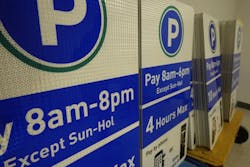For decades, the city of Seattle’s sign shop produced signs by screen printing or computer cut overlays. But today’s sign shop looks nothing like its past. Thanks to a dedicated team, the shop is clean, lean, and reliable; an example of what is achievable by transitioning to modern digital printing with the Avery Dennison TrafficJet Print System.
Leading the transformation was sign shop Crew Chief Robin Ford. While digital printing was not new to Robin, its use in the shop had been limited to non-regulated signs and decals. For years, Robin watched as the industry worked to improve technology suitable for digitally printed traffic signs. “We were looking for production speed,” Robin said. “We're also looking at how it performs with reflective sheeting. Printing on reflective material was huge. Having multiple colors printed on reflective material meant that 70% of our signs didn’t need to be screened or plotter cut.”
His initial plan was to integrate the printer into their production for small batches only and continue to screen print and weed as needed. Three years later, the shop now runs three TrafficJet printers and has discontinued screen printing, going nearly 100% digital.
A nuisance for the shop operators, inks and cleaning solvents posed an environmental hazard. “We had to be fitted for respirators and work with our health and safety department to monitor wastewater and track chemical use,” explained Robin. TrafficJet inks are contained in sealed cartridges, with minor exposure to the atmosphere. “There is no noticeable smell with the TrafficJet printer and we’re no longer known for that awful screen printing smell.”
Robin brought up several examples of how the move to digital printing has helped his shop be more responsive to the needs of the public.
- Last year a rare snowstorm struck Seattle. The city needed 400 emergency road closure signs. “There’s no way we could’ve done that with screen printing or with plotter pens. The physical labor of weeding and then 8-10 hours of screen printing drying would take too long.”
-
An emergency bridge closure resulted in traffic engineering requesting a rush order of detour signs. “Being in a public service role, I need to be able to respond swiftly," said Robin. The shop quickly produced 150 detour signs using digital printers.
-
With digital printing, Robin is quickly printing signs, eliminating the need to keep an inventory of purchased signs from outside fabricators. He has freed up shop space and reduced the capital costs of carrying a larger and complicated inventory of roll goods.
To learn more about the Avery Dennison TrafficJet Print System, visit reflectives.averydennison.com/
